The Marvels of Music at Los Angeles Jewish Health


The Marvels of Music at Los Angeles Jewish Health
Around the world, December is a time for gift-giving, family meals, and shared celebration. It is also a time for music: from Chanukah medleys to Christmas classics, holiday tunes are the soundtrack of the season.
At Los Angeles Jewish Health, music plays an integral part of uplifting seniors’ spirits and enhancing their health and wellness throughout the year, from birthdays to holidays and beyond. Well-documented evidence shows that music has numerous health benefits for people of all ages, perhaps none more so than members of an aging population.
“Listening to music can help with anxiety, depression, and stress; it can also help reduce blood pressure and improve sleep,” says Noah Marco, MD, LAJH’s chief medical officer. “In addition, it activates parts of the brain that are involved in thinking, movement, and emotion. It’s been shown to help people recovering from a stroke with verbal memory and focus, and to connect people suffering from advanced dementia to their positive past memories.”
Supporting seniors through music is a major focus of life at LAJH. The Music Therapy Program at the Brandman Centers for Senior Care PACE is just one example. A board-certified music therapist brings instruments to the center and involves participants in expressing themselves musically: singing and making rhythms while reflecting on how music has shaped their lives.
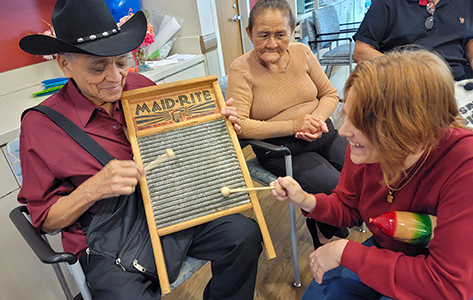
“The program is awesome—the music is just wonderful. It helps you relax, stay calm, and it helps you mentally because by singing together with people in a group, you know you’re not alone,” says program participant Theresa Vincent. “I would encourage everybody to do music therapy at Brandman!”
Music therapy is also provided to residents through a partnership with California State University, Northridge (CSUN). The collaboration brings students working toward their music therapy degree to LAJH, where they engage residents with percussion-based instruments and population-appropriate activities.
The CSUN students’ effort and skill are deeply appreciated by those who take part in the gatherings. “These students bring so much joy and make us feel better, we forget about our troubles and are just happy,” says one memory care resident at LAJH’s Goldenberg-Ziman Special Care Center.
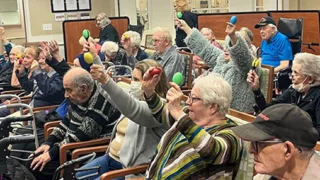
At the Joyce Eisenberg-Keefer Medical Center, residents participate in a different type of music therapy: the Wahlbangers Drum Circle, which leads them through low-impact exercises proven to activate both hemispheres of the brain.
“From helping residents modulate their emotions to encouraging concentration and cooperation, the benefits of the drum circle are many-fold,” says Susan Leitch, director of therapeutic activities. “The activity is universally accessible: Everyone can play, no matter their experience level.”
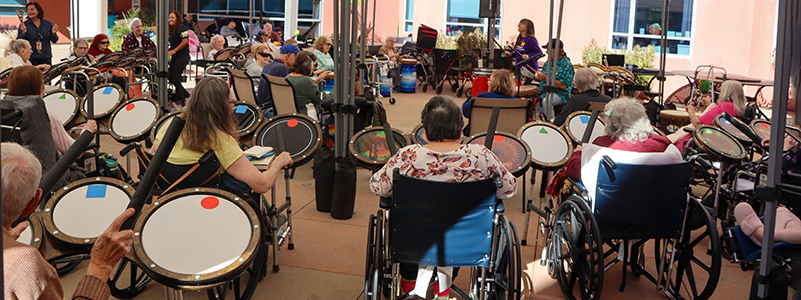
Young people frequently share their musical gifts with LAJH residents. “We are extremely fortunate to have so many talented individual musicians and groups volunteer from colleges, secondary schools, and synagogues. They visit LAJH almost weekly,” says LAJH Special Projects Coordinator Julie Lockman-Gold, whose role is supported in part by the Steven Ohren Foundation. In one instance, a resident had not played his bass in years, due to a stroke that made it challenging for him. A caring visit by a music major in college enabled him to feel confident in picking up his bass, and they played tunes together throughout the afternoon.
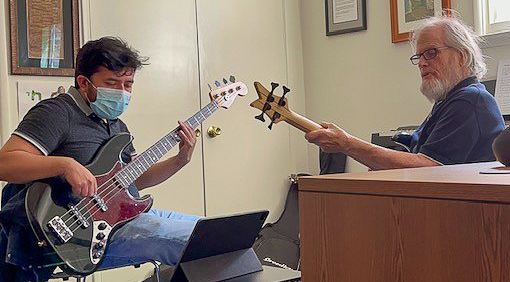
The number of outstanding performances is too numerous to list. Shining examples include a college student who has been playing the cello for LAJH audiences since he was in high school and a jazz band that performs for LAJH’s annual “Senior-Senior Prom.” Schools that have visited the campuses include UCLA, de Toledo High School, Brentwood School, Harvard-Westlake, Sierra Canyon School, Kadima Conservatory, and more.
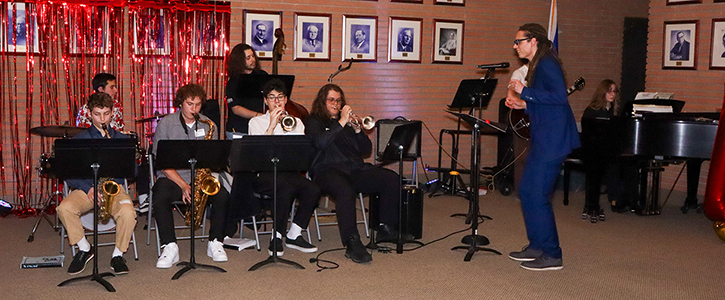
In honor of Father’s Day and thanks to support from the Steven Ohren Foundation, the Inner City Youth Orchestra of Los Angeles, the largest majority African American orchestra in America, treated residents to a moving concert. “I always tell residents, ‘You don’t have to go to Disney Hall to hear a phenomenal concert,’” says Stacy Orbach, Los Angeles Jewish Health’s director of volunteer services, “because we bring the sounds of Walt Disney Concert Hall to you!”
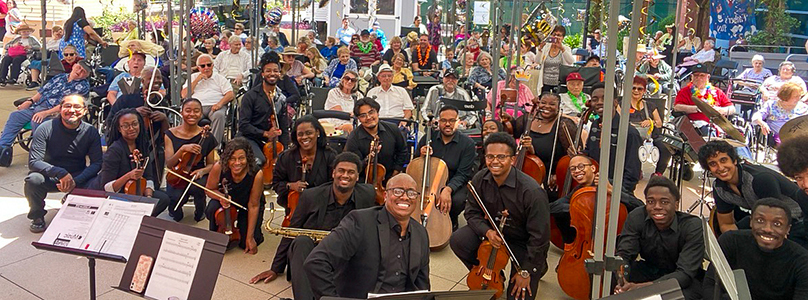
Music plays a central role in LAJH’s Jewish holiday celebrations, as well. At Passover and Yom Ha’atzmaut, Jewish music specialist Cindy Paley joins Chief Mission Officer Rabbi Karen Bender and Rabbi Ron Goldman in leading residents in song. Shabbat and other prayer services also prominently feature music. “Our residents love music, so we incorporate it into so much of what we do here,” says Rabbi Bender. “Especially when we play Israeli or Yiddish songs, people respond so positively because that music really brings back memories.”
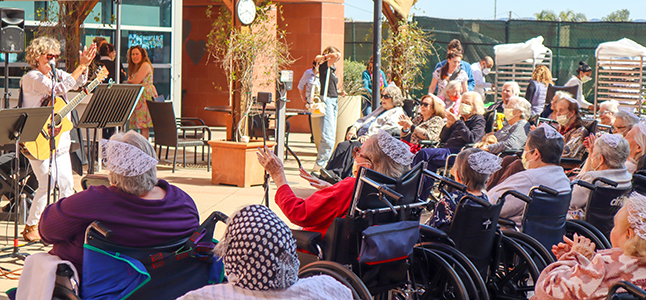
The music agenda at Fountainview at Eisenberg Village is robust. Entertainment is available two Saturday evenings a month, including a summer concert series. Music is also a pivotal component of holidays at Fountainview: the Swing Dolls, a 1940s-style, Andrew Sisters tribute band, performed this past Veteran’s Day and July 4th, and during Chanukah residents will enjoy the musical stylings of a traditional klezmer band.

LAJH’s myriad of music programs and therapies are made possible by the support of generous benefactors including The Steven Ohren Foundation—dedicated to assisting the elderly with medical and living expenses, with a special emphasis on the Jewish population—and Mount Sinai Memorial Parks and Mortuaries, a longtime supporter of LAJH residents, which recently made a gift to help expand LAJH’s music programs. Individual donors are also essential for the ability of the music programs to thrive.
Residents at LAJH find many opportunities to showcase their own musical talents, as well. Whether playing a piano inside one of the residential buildings, staging a Passover play or Purim spiel, or teaming up with fellow residents to write and compose songs, many talented residents participate in the world of music available to them.
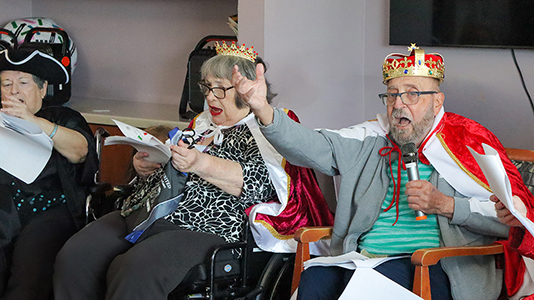
“Music truly infuses everything at LAJH,” says Annette Weinberg, LAJH’s campus lifestyle and enrichment director for Eisenberg Village. “Watching residents’ faces light up when the music starts is just the most amazing thing.”